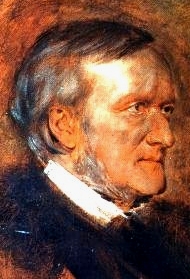|
Xtend
 Listen
Listen
 Period
Period
 Country
Country
 Notes
Notes
 Quotation
Quotation
 Projects
Projects
 Dictionary
Dictionary
 Finders
Finders
|
Born: 22 May 1813, Leipzig,
Germany
Died: 13 February 1883, Venice,
Italy

Wagner, Richard
A German composer, one of the musicians who possessed
the greatest impact in the history of music, and the person who caused
the most essential change in opera
composer, one of the musicians who possessed
the greatest impact in the history of music, and the person who caused
the most essential change in opera ,
since the days of Gluck ,
since the days of Gluck .
A remarkable innovator both in harmony and in his view of dramatic composition,
in which the arts were brought together into a single unity in the "musical
drama" .
A remarkable innovator both in harmony and in his view of dramatic composition,
in which the arts were brought together into a single unity in the "musical
drama" ,
as Wagner prefered to call opera. ,
as Wagner prefered to call opera.
Wagner upgraded the orchestra to
the rank of a leading part, and developed Weber's concept of "leitmotif"
concept of "leitmotif" (leading motif), in which a tune represents an idea or a character in an
opera, and it is played with every mention or appearance of the later,
advancing the story.
(leading motif), in which a tune represents an idea or a character in an
opera, and it is played with every mention or appearance of the later,
advancing the story.
His operas include "Tristan
and Isolde" ("Tristan
und Isolde"), "Persifal" ,
and especially "The Ring", which
is a four full-length operas cycle, consisting of "The
Gold of the Rhein" ("Das
Rheingold"), "The
Valkyries" ,
and especially "The Ring", which
is a four full-length operas cycle, consisting of "The
Gold of the Rhein" ("Das
Rheingold"), "The
Valkyries" (Die Walküre),
"Siegfried"
and "The
Twilight of the Gods" ("Götterdämmerung").
Other known music drama by Wagner is "The
Mastersingers of Nuremberg" ("Die
Meistersinger von Nürnberg") and "The
Flying Dutchman"
(Die Walküre),
"Siegfried"
and "The
Twilight of the Gods" ("Götterdämmerung").
Other known music drama by Wagner is "The
Mastersingers of Nuremberg" ("Die
Meistersinger von Nürnberg") and "The
Flying Dutchman" ("Der
Fliegende Hollander").
("Der
Fliegende Hollander").
Wagner, whose financial state was
poor, received, during his last years, a pension from King
Ludwig II of Bavaria, which also helped him
to found the Bayreuth
Festival, where his operas are performed regularly to this very day. He
spent his old age married to Kozima,
the daughter of another great composer - Liszt . .
Also a philosopher and a scholar
of German nationalist ideas, Hitler admired his music, years after Wagner's death,
and saw it as music representing the ideas of Nazism. Because of this linkage
between music and ideology and his extreme antisemitism, Wagner was excluded
in the State of Israel from
concert and radio programs, for many years.
admired his music, years after Wagner's death,
and saw it as music representing the ideas of Nazism. Because of this linkage
between music and ideology and his extreme antisemitism, Wagner was excluded
in the State of Israel from
concert and radio programs, for many years.


Wagner on the WWW
 Sites
Sites
|
 Audio
Audio
|
 Video
Video
|
 Images
Images
|
 MIDI
MIDI
|
|
Description
He was
a poet
He Lived in the
 Romantic period
Romantic period
In
 Germany
Germany
|